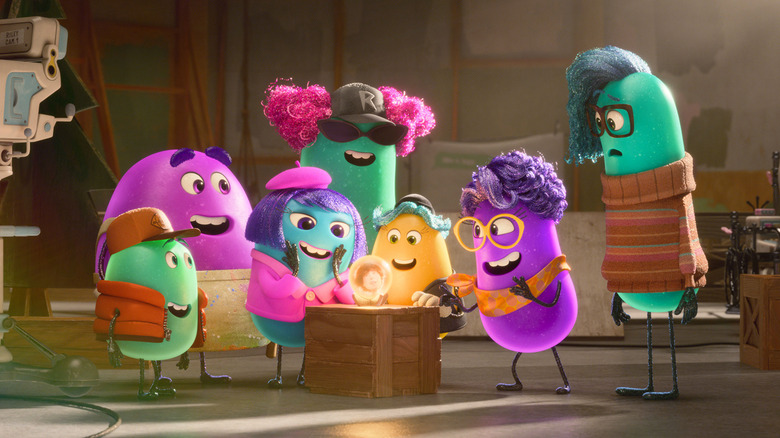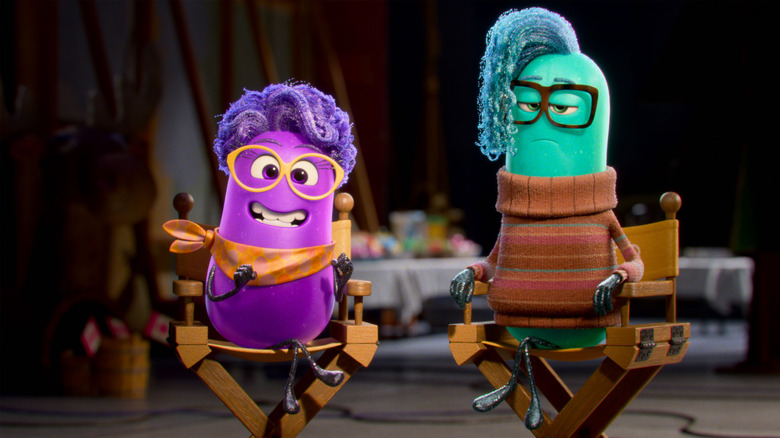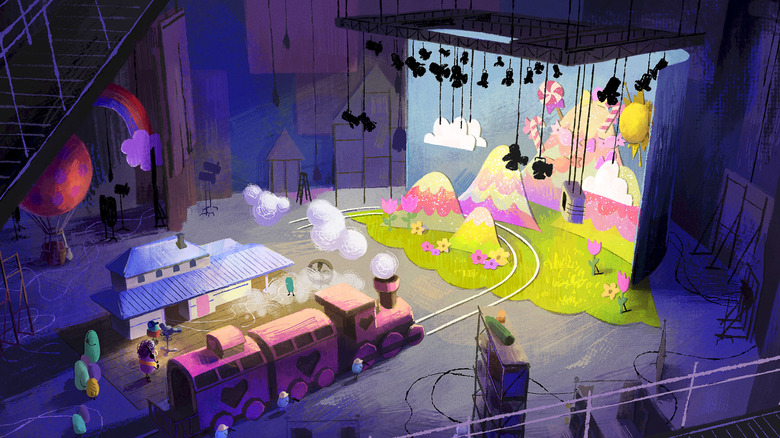Dream Productions Review: Inside Out Spin-Off Isn't A Nightmare - But It's Not Essential Either
- Fun concept for a workplace sitcom
- Amusing voice performances
- Breaks the world-building logic of Inside Out
- Keeps adopting and dropping a mockumentary framing
- Doesn’t need so many ties to the movie characters
After "Moana 2" was retrofitted from a streaming series to a blockbuster sequel, it's easy to imagine a universe where "Dream Productions" was hastily repackaged as "Inside Out 3." The four-episode Disney+ spin-off from Pixar's beloved franchise doesn't relegate the core emotions from the story altogether, with the narrative driven by the same tween drama as both previous "Inside Out" films. Here, young Riley (Kensington Tallman) once again overthinks a major milestone in her life and how her peers will respond to it. The lens with which we view the story through has shifted, but it's to everybody's benefit that Disney didn't call a last-minute shareholder meeting to announce this would become a big-screen threequel after "Inside Out 2" broke box office records.
Running at just over 90 minutes when watched in one sitting, "Dream Productions" is far slighter than the two cinematic efforts in this franchise, with no emotional gut punch equivalent to its big screen siblings. However, despite telling an overarching story, it does have the seeds of an enjoyable workplace sitcom, taking us behind the scenes of the movie studio who creates Riley's dreams, an ecosystem designed to replicate modern Hollywood right down to studio heads who think they know better than the creative teams themselves.
The biggest flaw of the series is that it adopts and drops an "Office"-style mockumentary framing whenever it chooses, the first time Disney has utilized this template since the lackluster "Muppets" ABC series almost a decade prior — and one that's especially baffling considering that, in the internal logic of the show, nobody could possibly be watching the documentary being shot.
Dream Productions struggles with logic and new ideas
"Dream Productions" has as many ideas as the "Inside Out" films, but with less care taken to integrating this into the pre-established world-building. Due to the prestige of the Pixar brand and the broad film industry parody, the series isn't solely concerned with entertaining young audiences, which leaves itself far more open to criticism on this front; it's hard to turn your brain off to the mechanics of Riley's imagination after two films that were heavy on exposition about how it operates. Here, creator Mike Jones — a co-screenwriter on "Soul" and "Luca" running the show for the first time — finds it hard to reconcile new ideas that can expand upon the formula with a consistent logic to how they work. The biggest action sequence (if we can call it that) revolves around Riley sleepwalking for the first time, and by that point, it feels like the creative team has thrown in the towel on finding a way to coherently link this to her dreams and sleep cycle.
The series is set somewhere between the first two films, after Riley has settled into a new school but before she attends hockey camp and a whole host of pubescent emotions crash the party. The action here revolves around the week leading up to her first school dance, which she's still up in the air about attending; she doesn't have a date, and her mom has gifted her an ugly dress to wear, all giving her anxiety about going. Inside her head, blockbuster dream director Paula Persimmon (Paula Pell) is oblivious to these tween anxieties and keeps producing dreams involving magical rainbow unicorns she should have long grown out of. Studio head Jean (Maya Rudolph) wants to shake things up by adding drama that the tweens love, promoting daydream director Xeni (Richard Ayoade, playing an iteration of the filmmaker character he played in Joanna Hogg's "Souvenir" films) to the big leagues, but his different approach to storytelling causes clashes with Paula — and the dreams they create only deepen Riley's debilitating anxiety.
It doesn't realize its potential
This is a fun dynamic that could sustain a long-running series rather than the one-and-done spin-off this appears to be, with plenty of storytelling potential in this simple formula. The ways in which the projections of Riley's dreams shape her life decisions is every bit as impactful as her core emotions, and telling it at a greater remove from her daily routine ensures the internal comedy easily outweighs any meatier drama on the outside — perfect if you were to sustain this concept for several longer seasons. Unfortunately, "Dream Productions" is packaged as a self-contained story, its behind-the-scenes conflicts resolved by the finale, when it feels like we're only scratching at the surface of its potential. This is why it feels so frustrating when half-baked ideas like the sleepwalking sequence are thrown in; that's a Season 3 idea designed to shake up a pre-established formula, not an Episode 3 idea added to the mix because the creative team felt a need to raise the stakes early on.
Elsewhere, throwaway lines hint at the creators being unaware of the limitations of this conceit. These characters are all stuck inside Riley's head, their only communication with the outer world being through her eyes — so why does Jean reference phone calls with the head of the film studio who lives in Riley's dad's head? The only answer that would make this fathomable is telepathy, and if this sounds like I'm overthinking a simple gag in a show aimed primarily at children, then think back to the world-building of the "Inside Out" movies, which ensured the logic was watertight for any young, curious minds wanting to know why the brain functioned in each specific way.
The big surprise with "Dream Productions" is that it would be better if it had fewer ties to "Inside Out." The voice cast behind Riley's core emotions, led by Amy Poehler as Joy, returns to their roles here, but are utilized solely to provide a running commentary on the dream broadcasts, like a G-rated "Beavis and Butt-Head." They never have direct contact with the characters on the studio floor and seem to have been forced into it to feel more like one of the movies, rather than let the series concept stand on its own two feet. After all, keeping them separated will eventually make kids ask themselves: if dreams are responsible for creating Riley's emotions here, then what use do Joy and the gang actually have? If "Dream Productions" were to stick to its guns as a workplace sitcom, it would have been a welcome addition to the franchise, but it ties itself in knots trying to prove itself worthy of being part of it.
"Dream Productions" premieres on Disney+ on December 11.


